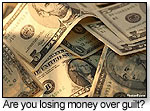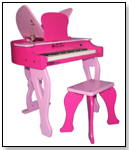|
|
How Survivor Guilt Prevents Sales Assuming What Customers Can Afford Helps NooneThe following article was reprinted with permission from the author. I received this email the other day, “Bob, my staff is going through your Sales Rx training. During one of the training sessions, we revealed a barrier that we need to address — guilt – of all things! As we discussed barriers, one employee admitted that she sometimes feels guilty selling high-end items when she doesn’t think the customer can afford it. Yikes!! Another said that she can relate to that. One employee’s husband was laid off by GM, another owned a store that closed a year ago, and we all have friends, neighbors and family facing financial hardship. This was unexpected because these are both very friendly, social people and I would have expected them to breeze through the 5 step sales process. I don’t want my staff to feel guilty about helping customers buy high-end items, I don’t want customers to feel guilty about spending, and I don’t want anyone to feel guilty about us staying in business! Do you have any words of wisdom on how to slay the guilt monster?” WOW! What a great topic and one that requires a lengthy answer. Stop Projecting  Traditionally, “Survivor guilt” is the term used to describe the feelings of those who, fortunately, emerge from a disaster which mortally engulfs others. Could be as a result of an airplane crash like Nando Prado in the Andes, a downsizing of a company like GM or even the closing of a competitor on Main Street. Traditionally, “Survivor guilt” is the term used to describe the feelings of those who, fortunately, emerge from a disaster which mortally engulfs others. Could be as a result of an airplane crash like Nando Prado in the Andes, a downsizing of a company like GM or even the closing of a competitor on Main Street.This business owner is from Michigan where the AP reported unemployment rates ranged from a low of 10.6 percent in Ann Arbor to a high of 17.4 percent in Flint. Of course people are scared. Survivor’s guilt plays out by projecting our worries onto our customers. It’s like the salesperson adopts a losers limp. On an irrational level, these individuals wince at their privileged escape from death’s clutches or worry they are next. I think there are 2 types of survivor guilt that affects sales:
But there’s one more that’s more insidious: self-image. We Are All Grown-Ups Do you remember the film "Ruthless People," where Judge Reinhold was trying to take advantage of a customer ? Here’s the clip: He reneges when he sees the guy’s wife is pregnant. He felt sales was a win-lose situation, that he was getting a whole pile of money for the little value customers received. It is a common trait in retail if we were all to be honest but even more so in places like Michigan and Vegas. I was pitching a huge casino in Las Vegas recently for a business makeover. They asked me if I knew what challenges they had, “Revenues are down, so you’re probably offering promotions to get people into the restaurants and bars on your property -loss leaders in the hopes of increasing sales. But your servers are only selling the discounted products, and you’re not making up the profits.” The president asked, “How do you know that?” “Because your servers are thinking, ‘ I wouldn’t pay 12 bucks for that drink or 30 bucks for that dinner, I couldn’t afford it I’m sure they can’t either.” When we prejudge what people can and can’t afford we’re shooting ourselves in the foot. I had an employee named Stewart who, when a frumpy dressed customer picked up a beaded leather vest and asked, “How much is this?” Stewart replied, “More than you can afford.” She hastily replied, “How do you know how much I can afford?” Stewart tried to cover-up and said, “Because I saw all those shopping bags you were carrying and figured you probably were maxed out.” Your employees gave you a gift by acknowledging they had “survivor’s guilt.” But the heart of the problem is how they feel like a sham selling at retail. Clerking is what they are comfortable with because their self-image doesn't allow them to put themselves out there to risk rejection. Give Them What They Really Want Your opportunity is to show how selling is a win — win situation. That we are helping the customer buy what they already want. But you’re not manipulating people, taking advantage, or making them into some kind of at a sucker for purchasing the premium items.We are all grownups and no one knows what another can afford. Maybe they’ve switched to generics in all of their grocery staples to afford the $100 LEGO Death Star for their daughter’s birthday. There’s no way of knowing. I think the sales training is an absolute. You may have to make the point you can’t stand still because you want your livelihood, your business to survive. That may have been why the other businesses folded, they thought they could just keep doing what they’d done and they’d be fine. The trick is showing them that change is good. That you are trying new things. Moving forward with your business and increasing sales is the key. But you also need to show them how their own preconceived ideas, biases and fears could very easily be pouring a bucket of water on a customer’s interest in the higher-priced items and causing the customer to question the purchase. If they can’t get past this, you have to ask yourself, “How much do I want to be their psychologist and deal with their self image?” and “Is there anybody else out there who can help me sell at a profit?” If not, it may be time to move on without them.  Writer's Bio: Bob Phibbs is the Retail Doctor®, a best-selling author and speaker who has helped thousands of independent businesses compete. His new book, The Retail Doctor’s Guide to Growing Your Business has received praise from both Inc. magazine and USA Today and can be found at your local bookstore or ordered at http://www.retaildoc.com/guide. He and his work have been featured in the New York Times, the Wall Street Journal and Entrepreneur magazine. Questions? Contact Bob at info@retaildoc.com. This article was reprinted with permission of the author, Bob Phibbs, aka The Retail Doctor®. Read more articles by this author Writer's Bio: Bob Phibbs is the Retail Doctor®, a best-selling author and speaker who has helped thousands of independent businesses compete. His new book, The Retail Doctor’s Guide to Growing Your Business has received praise from both Inc. magazine and USA Today and can be found at your local bookstore or ordered at http://www.retaildoc.com/guide. He and his work have been featured in the New York Times, the Wall Street Journal and Entrepreneur magazine. Questions? Contact Bob at info@retaildoc.com. This article was reprinted with permission of the author, Bob Phibbs, aka The Retail Doctor®. Read more articles by this author |
| ||||||||||||||||||||||||||||||||
Disclaimer Privacy Policy Career Opportunities
Use of this site constitutes acceptance of our Terms of Use.
© Copyright 2025 PlayZak®, a division of ToyDirectory.com®, Inc.



